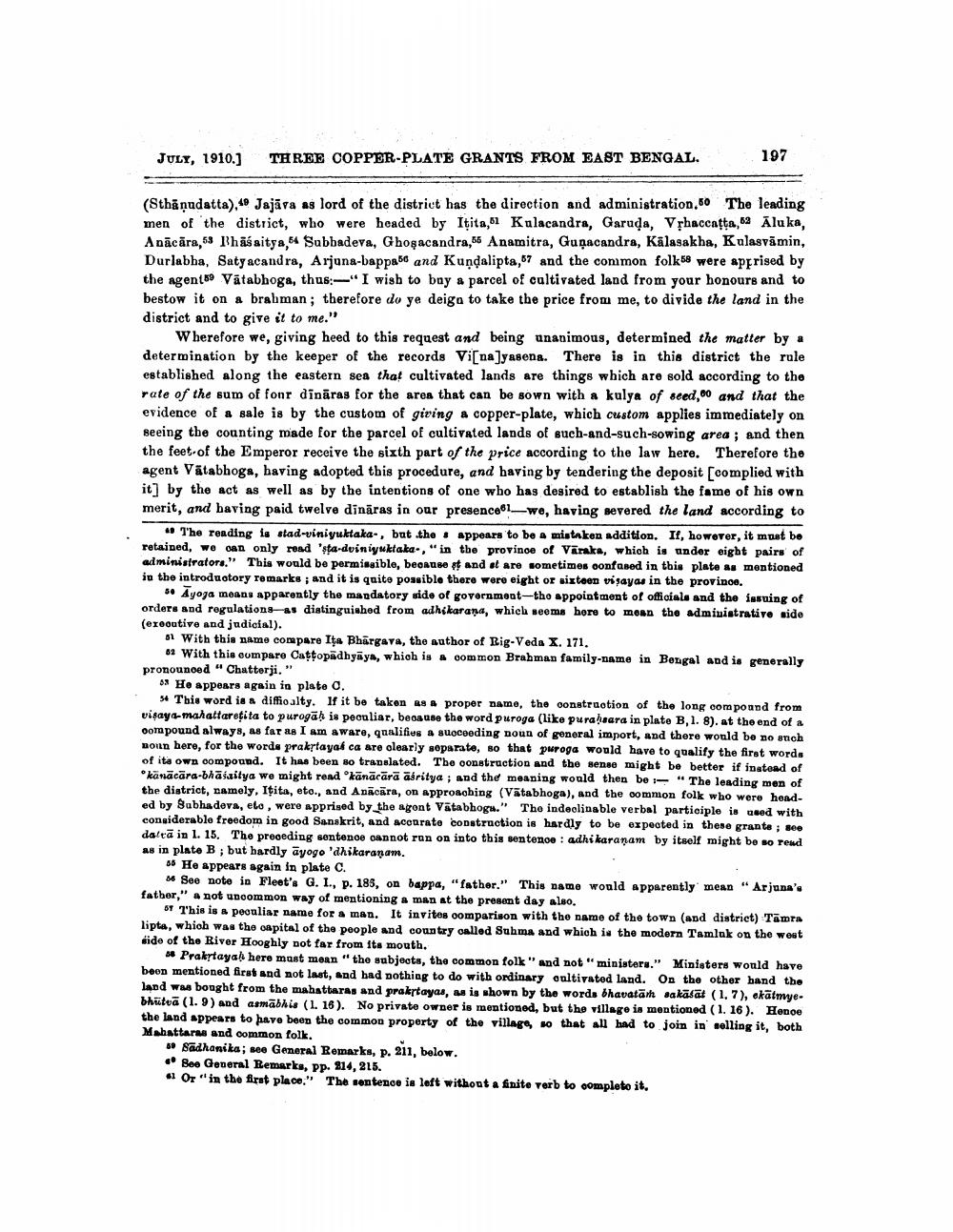________________
JULY, 1910.)
THREE COPPER-PLATE GRANTS FROM EAST BENGAL
197
(Sthå nudatta).49 Jajara as lord of the district has the direction and administration,50 The leading men of the district, who were headed by Itita, 51 Kulacandra, Garuda, Vrhaccatta, 62 Āluka, Anācāra, 53 Bhāśaitya,64 Sabbadeva, Ghosacandra,56 Anamitra, Guņacandra, Kalasakha, Kulasvamin, Durlabha, Satyacandra, Arjuna-bappa 50 and Kundalipta,67 and the common folk 58 were apprised by the agent89 Vätabhoga, thus:-"I wish to buy a parcel of cultivated land from your honours and to bestow it on a brahman; therefore do ye deiga to take the price from me, to divide the land in the district and to give it to me."
Wherefore we, giving heed to this request and being unanimous, determined the matter by a determination by the keeper of the records Vi[na]yasena. There is in this district the rule established along the eastern sea that cultivated lands are things which are sold according to the rate of the sum of four dināras for the area that can be sown with a kulya of seed, and that the evidence of a sale is by the custom of giving a copper-plate, which custom applies immediately on seeing the counting made for the parcel of cultivated lands of such-and-such-sowing area, and then the feet of the Emperor receive the sixth part of the price according to the law here. Therefore the agent Vätabhoga, having adopted this procedure, and having by tendering the deposit [complied with it] by the act as well as by the intentions of one who has desired to establish the fame of his own merit, and having paid twelve dināras in our presence1_we, having severed the land according to
. The reading is stad-viniyuktaka, but the appears to be a mistaken addition. If, however, it must be retained, we can only read 'sta-dyin iyuktaka., "in the provinoe of Varaka, which is under eight pairs of administrators." This would be permissible, because and at are sometimes confused in this plate as mentioned in the introductory remarks ; and it is quite possible there were eight or sixteen visayas in the province.
5. Ayoga means apparently the mandatory side of government-tho appointment of officials and the issuing of orders and regulations as distinguished from adhikarana, which seems here to moun the administrative side (erooutive and judicial).
01 With this name compare Ita Bhargava, the author of Rig Veda X. 171.
01 With this compare Cattopadhyāya, which is common Brahman family name in Bongal and is generally pronounced " Chatterji."
** He appears again in plate 0.
94 This word is a diffio alty. If it be taken as a proper name, the construotion of the long compound from visay-mahattaretita to purogāh is peculiar, because the word puroga (like purahaara in plate B, 1. 8). at the end of a oompound always, as far as I am aware, qualifius a suoceeding noun of general import, and there would be no anch noun hero, for the worde prakrtayai ca are clearly separate, so that puroga would have to qualify the first words of its own compound. It has been so translated. The construction and the sense might be better if inatoad of
kanācāra-bhāśaitya we might read okänācārā abritya ; and the meaning would then be "The leading men of the district, namely, Ițita, eto., and Anācāra, on approaching (Vätabhoga), and the common folk who were headed by Subhadeva, elo , were apprised by the agont Vätabhoga." Tho indeclinable verbal participle is weed with congiderable freedom in good Sanskrit, and accurate construction is hardly to be expected in these grants ; see daltā in l. 15. The preceding sentenos cannot run on into this sentence : adhikaranam by itself might be so read as in plato B ; but hardly ayogo 'dhikaranam.
66 He appears again in plate C.
- Soo note in Fleet's G. I, p. 185, on bappa, "father." This name would apparently mean "Arjuna's fatber," a not uncommon way of mentioning a man at the present day alao.
of This is a peculiar name for a man. It invites comparison with the name of the town and district) Tamra lipta, which was the capital of the people and country called Suhma and which is the modern Tamluk on the west side of the River Hooghly not far from its mouth.
** Prakrtayah here must mean "the subjects, the common folk" and not " ministers." Ministers would have beon mentioned first and not last, and had nothing to do with ordinary cultivated land. On the other hand the land we bought from the mahattaras and prakrtayas, mis shown by the words bhavatā sakālāt (1,7), okaimyebhiitvā (1.9) and asmābhis (1. 16). No private owner is mentioned, but the village is mentioned (1. 16). Honoe the land appears to have been the common property of the village so that all had to join in selling it, both Mahattarts and common folk.
*Sadhanika; see General Remarks, p. 211, below. . Bee General Remarks, Pp. 214, 215. • Or" in the first place." The sentence is left without a finito verb to completo it.




